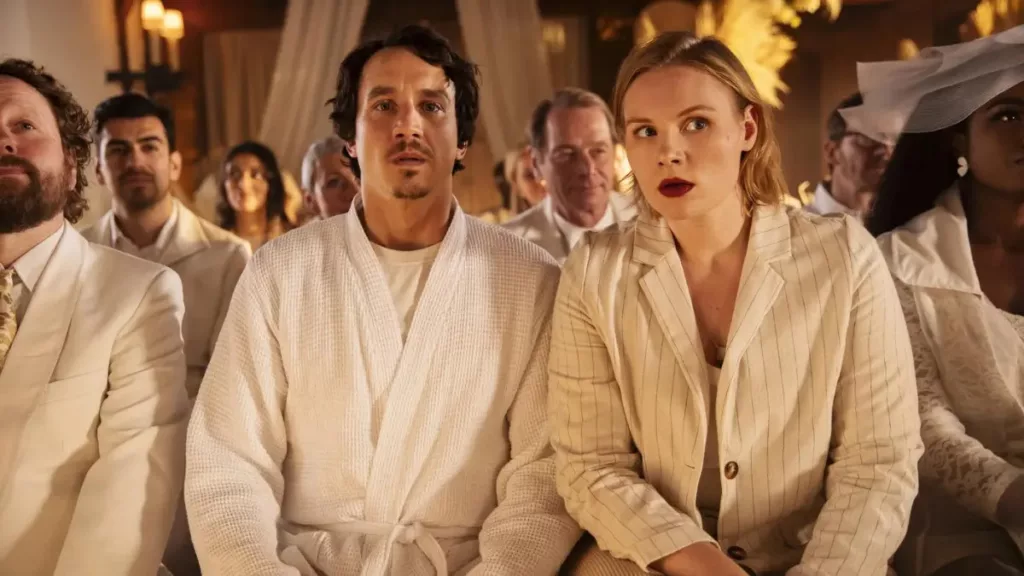The Heartbreak Agency tells the story of a troubled writer and a caring therapist whose chance meeting sets them both on an unexpected path. Directed by Shirel Peleg, this romantic dramedy from Germany stars Rosalie Thomass as Maria, the founder of an agency helping people through heartbreak. Laurence Rupp plays Karl, a cynical magazine columnist who targets Maria in a scathing article, only to find his own views challenged when he’s forced into her unconventional therapy program.
As two strong-willed but damaged souls wary of love, Maria and Karl seem destined to clash. Yet perhaps helping others heal might help them find healing of their own. Overchallenging long-held beliefs is difficult, but keeping an open mind could lead somewhere nourishing.
Through humor, empathy and honest self-reflection, might this unlikely pair learn the value of trust, acceptance and new beginnings? That’s what draws us to this tale – to witness the power of human connection, even in the most unexpected of places.
From Criticism to Care
At the center of The Heartbreak Agency’s story is an unlikely duo learning that first impressions can be deceiving. Karl seems hellbent on mocking what he doesn’t understand – Maria’s work giving emotional support. Yet beneath the surface lies a man in deeper pain than even he realizes. Maria, meanwhile, dedicates her days to mending broken hearts, though her methods raise eyebrows. Through their process of understanding one another, both find themselves changing in ways neither foresaw.
When we first meet Karl, he’s the type to kick others while they’re down. As a writer, he skewers subjects with little care for nuance or empathy. His girlfriend’s recent breakup leaves him threatened, fueling even more toxic behavior. But truly, Karl shields real vulnerability beneath bravado and bluster. A revelation hints at heartbreaks in his past, leaving scars never fully healed.
It’s here that Maria enters as an unlikely healer. Through her agency’s mix of therapy and community support, she helps people see their inherent worth beyond relationships. Karl is forced to experience her methods firsthand, deepening his cynicism but also cracking his armor. In Maria’s company, he interacts with a variety of patrons, glimpsing recovery is a process – not a destination – and that opening up can relieve burden rather than expose weakness.
Naturally, Maria proves a steadying presence for Karl throughout turmoil. Her calm guidance counters his volatility, while genuine care for people’s wellbeing challenges his cynicism. She refuses writing him off as a lost cause, sensing a humanity in him that’s been forgotten. Their time together shows that rehabilitation is possible, even for the most damaged of souls, if one leads with empathy, patience and compassion.
Through balancing each character’s perspective, the film explores how two opposites find connection. Karl’s journey depicts personal growth as nonlinear – one steps forward, then back, before progress. Maria stands as proof that belief in someone’s potential can spark internal change. Their dynamic raises thoughtful questions. Can we see beyond surface biases to understand another’s struggles? How might society benefit if we address root causes rather than symptoms of toxicity? When we open our eyes to humanity in unlikely places, what doors of good may open?
The Heartbreak Agency invites reflecting on these kinds of questions by bringing light to dark corners of the human experience. At its heart, it’s a story about the redemptive powers of acceptance, compassion – and discovering we all have more in common than we differ. Some may find its romance predictable, but its themes of healing remain poignant long after credits roll.
Bringing the Characters to Life
At the center of any film are the performances that breathe life into the characters. In The Heartbreak Agency, Rosalie Thomass shines as Maria, owning the role with her grounded and nuanced portrayal. From the first moment we meet her, Maria feels authentic in her commitment to helping others through difficult times. Thomass paints Maria as a steady, calming presence even when faced with doubters like Karl. She imbues the character with quiet strength and empathy, anchoring the story.
Laurence Rupp equally rises to the challenge of conveying Karl’s transformation. In his hands, the character’s many layers peel back convincingly over time. Early on, Rupp ensures the audience feels Karl’s prickly defensiveness, but also the deep wounds beneath.
As Karl softens throughout his therapy experience, Rupp makes the journey believable each step of the way. The viewer truly sees how this man accustom to lashing out learns healthier ways of interacting with the world. Both Rupp and Thomass bring honesty and care to complex roles that could have easily become tropes in less skilled hands.
Worthy of mention also is Cora Trube’s performance as Hedi, a regular at Maria’s agency. With warmth and humor, Trube breathes life into Hedi’s optimism despite past hurts. Her scenes provide lightness that balances heavier moments.
All in all, strong direction combined with talented acting elevate The Heartbreak Agency above formulistic storytelling. Audiences connect with the characters precisely because of how convincingly the performers inhabit their lives and transformations.
Thoughtful Direction amid Familiar Visual Flair
Director Shirel Peleg faces the difficult task of adapting a rom-com story struggling with familiar tropes into a genuinely enjoyable film. Through her solid direction, The Heartbreak Agency rises above expectations in parts. Peleg keeps scenes intimate through close camerawork that lets performances shine. Splashy romantic gestures are avoided in favor of nuanced glances and body language speaking volumes. This tones down more hackneyed elements while amplifying emotional intimacy.
Cinematographer Kai Jüngling-Jensen lends visual interest through color-infused production design. Scenes set in Maria’s heartbreak agency positively glow with reds and pinks. In contrast, Karl’s flat exudes cool blues reflecting his detached outlook. Clever use of lighting brings flickers of warmth even to sterile backdrops during Karl’s progression.
Musical choices are less impactful. A jazz-infused score fits rom-com need for levity but fails to leave lasting imprints. Still, Peleg’s skilled directorial touches boost chemistry between leads where the material risks faltering. Overall, she guides viewer investment in characters’ journey through understated yet vibrant filmmaking.
While far from perfect, Peleg utilizes her skills to uplift The Heartbreak Agency past generic expectations. Visual panache and assured handling of acting talents inject renewed life into overfamiliar narrative contours. It’s to the film’s credit that directing navigates past scripting quirks to prioritize emotive core through diligent craft.
Heartbreak Agency and the Rom-Com Playbook
It’s no secret that The Heartbreak Agency leans heavily on well-worn romantic comedy tropes. From the banter between opposites Maria and Karl to the familiar will-they-won’t-they storyline, this film hits familiar beats. Directors have mined rom-com gold from such tropes for decades. However, heavy reliance on formula can grow stale without a fresh twist. Does The Heartbreak Agency offer meaningful subversion or does it feel like a well-thumbed page from the rom-com rulebook?
On one hand, the film earns points for questioning its own genre. Maria and Karl diss overwrought movie gestures as unrealistic. Their pointed dialogue shows self-awareness. Additionally, the central relationship stems from a rebuke column rather than love at first sight. This grittier beginning offers potential for unexpected romance. Yet ultimately, classic beats reassert themselves too predictably. Miscommunications that stall intimacy follow the well-worn pattern.
Peppering in meta discussions doesn’t fully liberate this story fromConstraints. The ending still sweeps resolution neatly into place through overdone catharses. More problematic is painting a unlikeable cad sympathetically with sparse character development. Reliance on suddeu reversals does disservice to exploring flawed individuals gradually. A smarter script would match character depth with stripped-back plotting.
Perhaps most significantly, framing Maria as the sole agent of Karl’s salvation borrows the tired savior trope. While her compassion draws viewers in, the narrative depends on remodeling a man she owes nothing. Refocusing their dynamic as one of mutual understanding between complex equals could have balanced this.
As it stands, The Heartbreak Agency demonstrates rom-coms remain an imperfect vehicle, even for tales of relationships. Growing past familiarity demands persistent self-examination from storytellers. When lazily employing conventions outweighs thoughtful exploration of human foibles and connections, the genre risks feeling stale. With some bold reshaping, this film could have offered a heartening tale deftly sidestepping expectations.
The Troubling Transformation of Karl
One of The Heartbreak Agency’s clear missteps lies with its handling of protagonist Karl. Introduced as an obnoxious womanizer spouting sexist remarks, little endears him to viewers from the outset. His characterization during the first half relies on exaggerated toxic traits, painting him as veritably unlikable. Karl dishes out demeaning commentary yet displays no redeeming qualities, making it puzzling why anyone, let alone Maria, would invest in his change.
This raises valid questions around whether Karl truly evolves or merely modifies his behavior. His motivations remain rooted more in self-interest than genuine introspection at key points. Additionally, unveiling a predictably tragic backstory does little to excuses his ongoing harmful behavior. A more nuanced portrayal showing early flickers of empathy may have lent credibility to his arc.
As presented, Karl’s sharp pivot from chauvinist to sensitive partner occurs swiftly and strains suspension of disbelief. Viewers witness no real struggle or setbacks in his transformation. His redemption transpires almost too effortlessly, without earning emotional payoff. A more gradual redemptive journey allowing glimpses of humanity may have rendered his progression feel genuinely moving rather than conveniently fabricated for the plot.
Even by the finale, Karl never seems to fully shed his sense of arrogance. He appropriates the lexicon of kindness yet displays incomplete understanding of societal issues. Without deeper reflection on his toxic views or making amends outside his relationship, can he truly be considered reformed?
Or does the film settle for surface change while bypassing transformative growth? In prioritizing romantic resolution over realistic character development, The Heartbreak Agency diminishes the impact of its central figure. A more nuanced examination of reckoning with prejudice could have left a far stronger impression.
The Heartbreak Agency: A Mixed Ending
So in the end, what to make of The Heartbreak Agency? On one hand, it attempts to deliver an insightful examination of modern love and relationships. Director Peleg strives to craft nuanced performances from her leads, highlighting their surprising connection. Yet other elements hold it back. Karl proves too abrasive initially, his redemption too pat. And relying on strained plot devices like contrived separation jeopardizes the sincerity built elsewhere.
While progressive in exploring therapy and feelings in a thoughtful manner, it seldom delves deep. Opportunities to comment meaningfully on societies ills get brushed aside. The film seem eager to resolve itself reassuringly rather than challenge preconceptions. This paints an incomplete portrayal, denying viewers fuller context and compromise they might find provocative.
Ultimately, The Heartbreak Agency straddles a line. Flashes of introspection and chemistry between its leads make it easier to invest than expected. But awkward missteps force it back into formula. The movie achieves moments of warmth, aided by charming central performances. Still, it settling keeps it from realizing higher ambitions hinted at early on. For those hoping therapeutic drama or bold deconstructions of genre, expectations may exceed what’s featured.
As a light entertainment for those seeking a gentle examination of relationships pros and cons, it could suffice. But viewers hoping for more provocative fare may find its perspective shallow and decisions safe. While not a complete misfire, The Heartbreak Agency settles for a mixed, surprisingly conventional ending rather than riskier routes that may have left a stronger impression.
The Review
The Heartbreak Agency
The Heartbreak Agency shows glimpses of insightful relationship exploration, buoyed by charming central performances. However, it ultimately plays it safe rather than taking risks that could have delivered a more nuanced or thought-provoking finished product. While pleasant enough as a low-stakes romantic diversion, the film fails to fully realize its potential or move beyond predictable story beats.
PROS
- Features thoughtful examination of therapy and human emotion
- Central performances by Rosalie Thomass and Laurence Rupp are charming
- Explores meaningful themes of modern love and personal growth
CONS
- Karl's character is too abrasive and unlikable initially
- His redemption arc is not fully earned or convincing
- Relies on contrived plot devices and fails to take narrative risks
- Fails to meaningfully comment on societal issues it hints at exploring
- Resolution settles for familiarity over challenging viewers further





















































